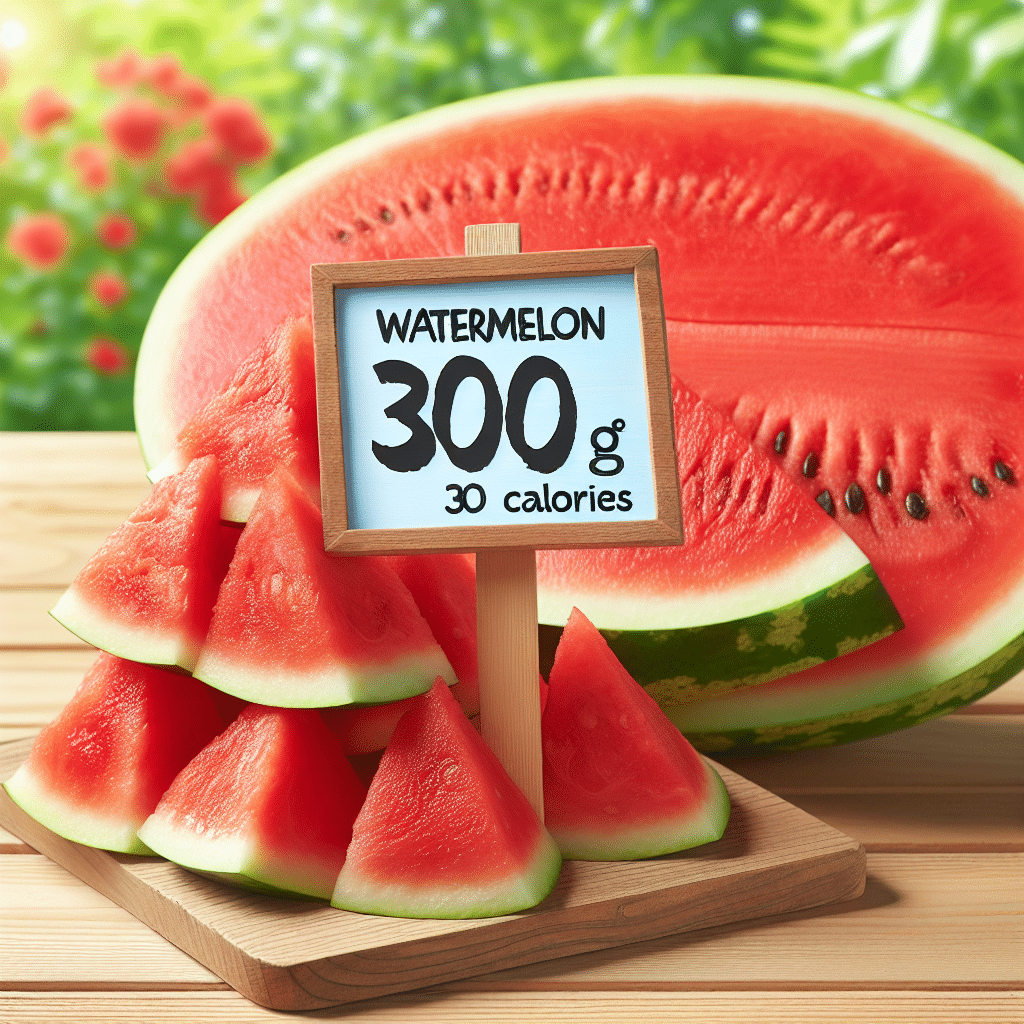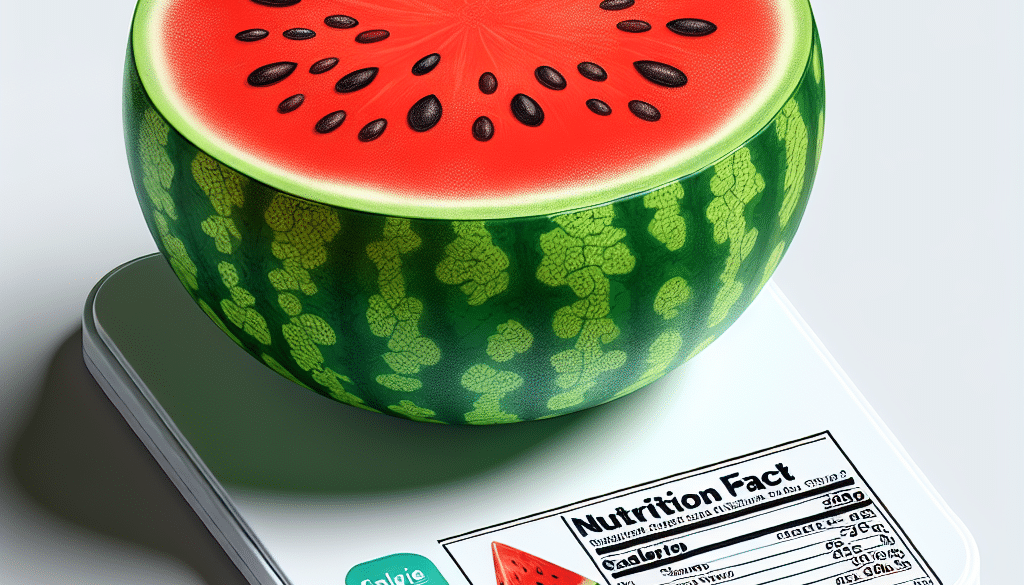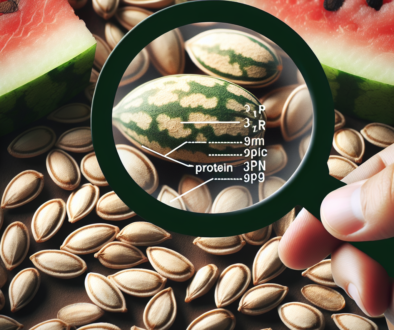300 Grams of Watermelon: Calorie Count
-
Table of Contents
- Watermelon Calorie Count: Understanding the Nutritional Value of 300 Grams
- Nutritional Breakdown of 300 Grams of Watermelon
- Health Benefits of Watermelon
- Comparing Watermelon to Other Snacks
- Incorporating Watermelon into Your Diet
- Conclusion: The Sweet Benefits of Watermelon
- Discover ETprotein’s Watermelon Seed Protein Products
Watermelon Calorie Count: Understanding the Nutritional Value of 300 Grams

Watermelon is a refreshing and hydrating fruit that is a staple during the summer months. Not only is it delicious and juicy, but it also offers numerous health benefits and is a popular choice for those looking to maintain a healthy diet. In this article, we will delve into the calorie count and nutritional profile of 300 grams of watermelon, providing you with a comprehensive understanding of what this sweet treat has to offer.
Nutritional Breakdown of 300 Grams of Watermelon
Watermelon is known for its high water content, which makes it an excellent choice for hydration. But what about its calorie content? Let’s break down the nutritional value of a 300-gram serving of watermelon:
- Calories: A 300-gram serving of watermelon contains approximately 90 calories, making it a low-calorie snack option.
- Water Content: Watermelon is made up of about 92% water, which means that a 300-gram serving contains roughly 276 grams of water.
- Carbohydrates: This serving size has about 22 grams of carbohydrates, primarily from natural sugars and a small amount of dietary fiber.
- Sugars: Within the carbohydrate content, there are about 18 grams of natural sugars present in watermelon.
- Fiber: Watermelon provides a modest amount of fiber, with 1 gram per 300 grams of fruit.
- Vitamins and Minerals: Watermelon is a good source of Vitamin C, Vitamin A, potassium, and other antioxidants and nutrients.
Health Benefits of Watermelon
Aside from being low in calories, watermelon offers a variety of health benefits:
- Hydration: Due to its high water content, watermelon helps keep you hydrated, which is essential for maintaining healthy body functions.
- Nutrient-Rich: It is packed with vitamins, minerals, and antioxidants, including lycopene, which has been linked to heart health and cancer prevention.
- Weight Management: The low-calorie count and high water content can help you feel full, making watermelon a great snack for those looking to manage their weight.
- Digestive Health: The fiber in watermelon supports a healthy digestive system by promoting regular bowel movements.
- Anti-inflammatory Properties: Compounds in watermelon have anti-inflammatory effects, which can help reduce inflammation and associated diseases.
Comparing Watermelon to Other Snacks
When considering calorie counts, it’s helpful to compare watermelon to other common snacks:
- A 300-gram serving of potato chips contains over 1500 calories, which is significantly higher than watermelon.
- Chocolate bars of the same weight can have upwards of 1600 calories, making watermelon a much lighter alternative.
- Even healthier snacks like almonds contain about 1700 calories per 300 grams, showcasing watermelon’s low-calorie advantage.
These comparisons highlight how watermelon can be a smart choice for those looking to enjoy a sweet treat without consuming too many calories.
Incorporating Watermelon into Your Diet
There are many creative ways to include watermelon in your diet:
- Enjoy it fresh and chilled as a standalone snack.
- Add it to salads for a refreshing twist.
- Blend it into smoothies or make watermelon juice.
- Create watermelon popsicles for a healthy frozen treat.
- Use it in salsas or gazpachos for a unique flavor combination.
With its versatility, watermelon can easily become a staple in your dietary routine.
Conclusion: The Sweet Benefits of Watermelon
In conclusion, 300 grams of watermelon is not only low in calories, approximately 90, but also rich in nutrients and health benefits. It’s an excellent choice for hydration, weight management, and providing your body with essential vitamins and minerals. By incorporating watermelon into your diet, you can enjoy a delicious and healthy snack that supports your overall well-being.
Discover ETprotein’s Watermelon Seed Protein Products
If you’re looking for a plant-based protein source to complement your healthy lifestyle, consider ETprotein’s watermelon seed protein products. These high-quality proteins are perfect for those seeking a nutritious addition to their diet, whether you’re an athlete, a health enthusiast, or simply looking to increase your protein intake with a plant-based option.
About ETprotein:
ETprotein, a reputable watermelon seed protein Chinese factory manufacturer and supplier, is renowned for producing, stocking, exporting, and delivering the highest quality organic bulk vegan protein and plant proteins. They include Organic rice protein, clear rice protein, pea protein, clear pea protein, watermelon seed protein, pumpkin seed protein, sunflower seed protein, mung bean protein, peanut protein etc. Their offerings, characterized by a neutral taste, non-GMO, allergen-free attributes, cater to a diverse range of industries. They serve nutraceutical, pharmaceutical, cosmeceutical, veterinary, as well as food and beverage finished product distributors, traders, and manufacturers across Europe, USA, Canada, Australia, Thailand, Japan, Korea, Brazil, and Chile, among others.
ETprotein specialization includes exporting and delivering tailor-made protein powder and finished nutritional supplements. Their extensive product range covers sectors like Food and Beverage, Sports Nutrition, Weight Management, Dietary Supplements, Health and Wellness Products, and Infant Formula, ensuring comprehensive solutions to meet all your protein needs.
As a trusted company by leading global food and beverage brands and Fortune 500 companies, ETprotein reinforces China’s reputation in the global arena. For more information or to sample their products, please contact them and email sales(at)ETprotein.com today.














